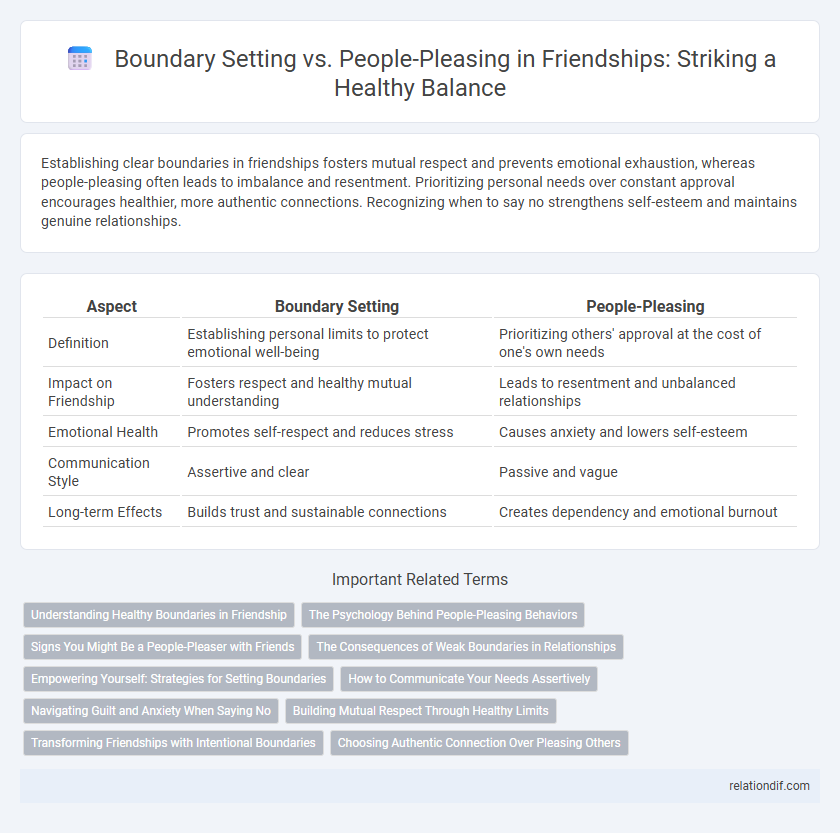Establishing clear boundaries in friendships fosters mutual respect and prevents emotional exhaustion, whereas people-pleasing often leads to imbalance and resentment. Prioritizing personal needs over constant approval encourages healthier, more authentic connections. Recognizing when to say no strengthens self-esteem and maintains genuine relationships.
Table of Comparison
| Aspect | Boundary Setting | People-Pleasing |
|---|---|---|
| Definition | Establishing personal limits to protect emotional well-being | Prioritizing others' approval at the cost of one's own needs |
| Impact on Friendship | Fosters respect and healthy mutual understanding | Leads to resentment and unbalanced relationships |
| Emotional Health | Promotes self-respect and reduces stress | Causes anxiety and lowers self-esteem |
| Communication Style | Assertive and clear | Passive and vague |
| Long-term Effects | Builds trust and sustainable connections | Creates dependency and emotional burnout |
Understanding Healthy Boundaries in Friendship
Healthy boundaries in friendship promote mutual respect, ensuring individual needs and limits are honored without sacrificing personal well-being. Setting clear boundaries prevents people-pleasing behaviors that can lead to emotional exhaustion and resentment. Understanding these boundaries fosters authentic connections based on trust and equality rather than obligation or guilt.
The Psychology Behind People-Pleasing Behaviors
People-pleasing behaviors often stem from a deep-rooted fear of rejection and a desire for social acceptance, making it challenging to establish healthy boundaries in friendships. Psychological patterns such as low self-esteem and anxious attachment contribute to the compulsion to prioritize others' needs over personal well-being. Understanding these underlying factors is crucial for fostering authentic connections and promoting balanced interpersonal dynamics.
Signs You Might Be a People-Pleaser with Friends
Constantly agreeing to plans despite feeling overwhelmed and avoiding expressing personal opinions often indicates people-pleasing tendencies in friendships. Struggling to say no and feeling guilty after setting boundaries can lead to emotional exhaustion and imbalance in relationships. Recognizing these signs helps establish healthier connections by prioritizing self-respect and mutual understanding.
The Consequences of Weak Boundaries in Relationships
Weak boundaries in friendships often lead to emotional exhaustion and resentment as individuals overextend themselves to meet others' expectations. People-pleasing behavior diminishes self-respect and creates imbalance, causing long-term strain in relationships. Establishing clear, respectful boundaries prevents enabling harmful dynamics and fosters mutual trust and respect.
Empowering Yourself: Strategies for Setting Boundaries
Setting clear boundaries is essential for maintaining healthy friendships and preserving your emotional well-being. Empower yourself by communicating your needs assertively, recognizing your limits, and practicing saying no without guilt. Prioritizing self-respect over people-pleasing builds stronger, more authentic relationships based on mutual understanding and trust.
How to Communicate Your Needs Assertively
Communicating your needs assertively in friendship involves clearly expressing your limits without guilt or apology, using "I" statements such as "I feel overwhelmed when plans change last minute." Establishing boundaries means prioritizing your emotional well-being while respecting others, preventing resentment from unresolved expectations. Effective communication fosters mutual respect, allowing friendships to thrive without the pressure of constant people-pleasing.
Navigating Guilt and Anxiety When Saying No
Setting boundaries in friendships is essential to maintain emotional well-being and prevent resentment, though it often triggers guilt and anxiety due to fear of disappointing others. People-pleasers struggle to say no, risking burnout and compromised authenticity when they prioritize others' needs over their own limits. Developing assertive communication skills helps navigate these feelings by affirming personal values while fostering genuine connections.
Building Mutual Respect Through Healthy Limits
Establishing clear boundaries is essential for building mutual respect in friendships, as it prevents the imbalance caused by people-pleasing behaviors that often lead to resentment. Healthy limits communicate personal needs and values while allowing space for others to express theirs, fostering a relationship grounded in trust and understanding. Prioritizing boundary setting over people-pleasing enhances emotional well-being and sustains long-term, respectful connections.
Transforming Friendships with Intentional Boundaries
Setting intentional boundaries in friendships fosters mutual respect and emotional well-being, preventing the exhaustion often caused by people-pleasing behaviors. Clear, consistent boundaries promote authentic connections by allowing individuals to prioritize their needs while honoring others' limits. Transforming friendships through boundary setting encourages healthier interactions and sustainable support systems.
Choosing Authentic Connection Over Pleasing Others
Setting clear boundaries cultivates authentic connections by prioritizing personal values and emotional well-being over the need to please others. People-pleasing often leads to resentment and loss of self-identity, undermining genuine relationships. Choosing honesty and respect in interactions fosters deeper trust and mutual understanding in friendships.
Boundary setting vs People-pleasing Infographic

 relationdif.com
relationdif.com